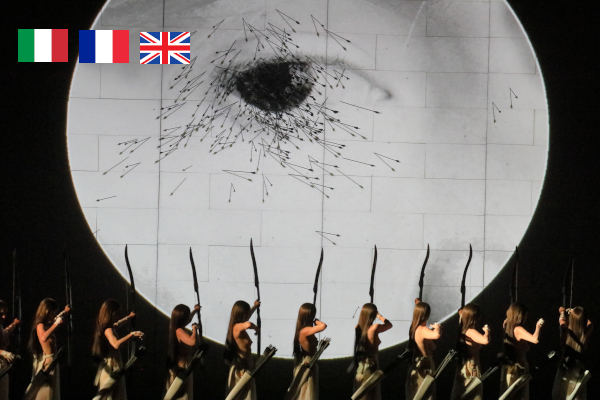Venus and the Virgin
by Susanne Krekel
Munich Staatsoper, July 21, 2024 - Nietzsche’s admiration for Wagner ceased after having heard Tannhäuser. Understandably so. What a notion to exalt the sexophobia and misogyny of the catholic church in such a way! Let’s remember the story: Tannhäuser (the hero), a knight of the landgrave of Thuringia’s court, is the lover and prisoner of Venus (the whore) in her reign, the Venus Mountain. He wants to leave, Venus refuses but in the end, at his naming the Virgin Mary, lets him go. Back at the court, he is welcomed by his companions, and the landgrave Hermann organises a song contest in his honour, the theme being ‟love”. The landgrave’s niece, Elisabeth (the virgin) is happy about the return of Tannhäuser, she’s in love with him. The young knight Wolfram, who is secretly in love with her, hears her rejoicing and instantly gives up on her. At the contest, all the knights celebrate the courtly and pure and virginal idea of love, until Tannhäuser exalts carnal love and lust and reveals his recent stay with Venus. Oh horror! The brave knights and Elisabeth are shocked and grieved indeed: their friend, their comrade, a criminal! Is it because he has known the joys of physical love (does the diktat of virginity before marriage also extend to males?) or because he has served a pagan goddess? Questions, questions… Anyway, the landgrave will order him to undertake a pilgrimage to Rome and beg for forgiveness in the highest places in order to save his soul. When he comes back, Elisabeth is about to die - probably from something that might be the infamous ‟hysteria”, this sickness of bourgeois females in the 19th century, deriving from simple sexual frustration, the female side of sex and pleasure being taboo at the time. Wolfram feels the approach of death and sings his greetings to his beloved evening star. Tannhäuser comes back and tells him about his pilgrimage and how the Pope himself refused to pardon him. The virgin Elisabeth however, has gone directly to heaven and has obtained the salvation of his soul. And so he dies as well.
Let’s put aside our doubts and the points of view of our time and have a look at what happens on stage:
Romeo Castellucci’s staging is situated in a phantasmagorical world, neither the imaginary Middle Ages of the Romantics, nor their own period. During the overture, on the dark and otherwise empty stage, a group of bare-breasted lady archers pierces the black and white picture of a man’s eye with arrows. Bow and arrows will turn up again and again, symbolising the wound made by love - or maybe the phallic symbol stands for the violence of penetration in the sexual act. Love, huh?
The scene in Venus’s reign is underlined by a group of dancers, who, lying on the floor and covered by something like flesh-coloured pantyhose, are moving nonstop, arms and legs in constant movement; well, it does take flesh for making love. Let’s see: arrows, a grotto, imprisonment - this wouldn’t be another version of the perfidious legend of the Vagina Dentata?
Act II, at the landgrave’s court takes place in a much more peaceful atmosphere: light veils, pastel-coloured, are undulating prettily, Elisabeth and Tannhäuser discreetly avow their love. The formidable Klaus Florian Vogt sings the part of Tannhäuser; with his bright slightly metallic timbre he is a perfect heldentenor, and he sounds natural and unstrained throughout this long part. If we cannot quite make out his character it is because he doesn’t quite understand himself, the hero is an immature being as it were. Between his love of the whore and his love of the virgin, rejected by his tribe and rejected by Rome - between his changing desires and the demands of the world, Vogt’s Tannhäuser stumbles, stands up, doubts, fights, without ever weakening; during Act III he sounds fresh and strong as in the beginning - chapeau! Elisabeth Teige is Elisabeth, wonderful as well, with her fresh clear soprano voice; she is convincing and touching. During Act III we see two tombstones, inscribed with the names of ‟Klaus” and ‟Elisabeth”. Two bodies in decomposition are lying on them and in the background we are informed of the passing of enormous amounts of time. Memento mori as it were. At the very end, Elisabeth and Tannhäuser will mingle the last remains of these decomposed bodies, united in death at least.
Andrè Schuen is Wolfram, the unhappy lover. He is an expert lied singer, making him the ideal cast for this role, and indeed in the Lied an den Abendstern his warm and velvety soft baritone takes all the colours of a warm night sky, lightened by a million glimmering and shining stars. Does Wolfram realize that he is evoking the Virgin Mary and Venus at the same time in his song?
Ain Anger, a formidable bass, sings the landgrave Hermann with authority and power.
Sebastian Weigle conducting of the wonderful Bayerische Staatsorchester is taut and precise without rigidity. The orchestra and its amazing woodwind section is in good hands with him.
Applause, bravos, standing ovations, this warm celebration is more than deserved.
An enjoyable evening all in all; if the libretto and the staging have left us with some questions, the music has made up for it all.


